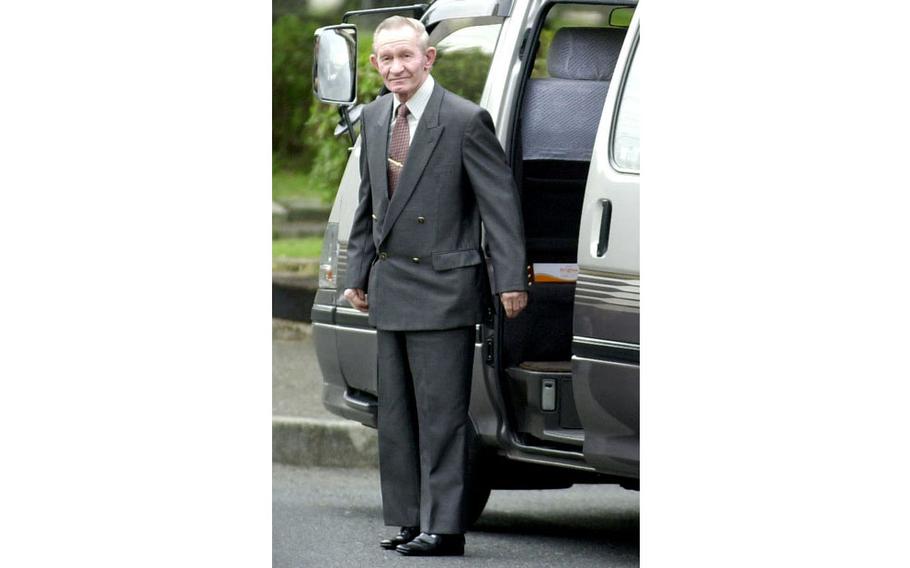
Sgt. Charles Jenkins arrivesat Camp Zama, Japan, returning voluntarily to military control after allegedly deserting almost 40 years ago to live in North Korea. (Jim Schulz/Stars and Stripes)
CAMP ZAMA, Japan — The Charles Jenkins saga drew nearer an end Wednesday when the Army sergeant was reduced in rank to E-1, dishonorably discharged and ordered to forfeit all pay and allowances and serve six months in prison after pleading guilty to desertion and aiding the enemy.
But, due to a pretrial agreement, he’ll serve just 30 days at a Yokosuka Naval Base confinement center. Col. Denise Vowell, the general court-martial judge, tossed out charges of encouraging disloyalty and soliciting other servicemembers to desert.
Capt. Seth Cohen, the prosecutor, had asked for a nine-month jail term.
Jenkins, 64, admitted he abandoned his South Korea post on Jan. 5, 1965. He later taught English to North Korean officer cadets being trained as spies.
His Japanese wife, Hitomi Soga, 45, and their two daughters sat somberly inside the Willie N. Sugihara Courtroom at U.S. Army Japan headquarters.
Jenkins was to be taken to Yokosuka on Wednesday night to begin his confinement, officials said.
“After observing today’s legal proceedings, it is clear to me that the United States military justice system has worked … precisely the way it was designed to work,” said Lt. Col. John Amberg, a U.S. Army Japan spokesman.
The case’s resolution accompanied tales of hardship, fear and struggles during four decades in communist North Korea. Jenkins, wearing his Class A uniform, fought tears as he recounted what led him to cross the DMZ that cold 1965 night.
Jenkins, then a 24-year-old with Company C, 1st Battalion, 8th Cavalry, 1st Cavalry Division at Camp Clinch, South Korea, told the court in a heavy southern accent that growing anxiety over the possibility of leading “hunter and killer” patrols along the border, combined with fears about being shipped to Vietnam, triggered bouts with alcohol and depression.
“I was getting a little scared. … The North Korean army often fired shots at us over the DMZ,” Jenkins said. “I didn’t want to be responsible for other soldiers under me if I was asked to lead the hunter-killer missions.
“I no longer wanted to be in the military. I just wanted to go home.”
Conferring throughout the court session with his defense lawyer, Army Capt. James Culp, Jenkins said he consumed about 10 beers the night he disappeared but claimed that didn’t affect his decision to desert.
He also led a squad out on ambush in the early hours of Jan. 5, 1965. At about 2:30 a.m., he testified, he told the other troops he’d advance to check out the road. Instead, he unloaded and tied a white T-shirt to his M-14 rifle to try to appear less threatening to the North Koreans.
He figured he’d be captured and sent to Russia, where he had a friend at the U.S. Embassy, and believed officials there would return him to the United States.
Asked by the judge if going to North Korea was a conscious choice, he responded, “I knew what I was doing, but it was a mistake. I didn’t know North Korea was gonna keep me.”
In a statement read by Culp before sentencing, Jenkins indicated that life across the border was “miserable.” During the first few years, he lived with three other alleged Army deserters in one room with no electricity or running water.
Life improved somewhat in 1980 when he married Soga, whom North Korean agents had abducted to teach Japanese language and customs to potential spies, Jenkins said.
From 1981 to 1985, he said, he agreed to teach English at a North Korean military academy in Pyongyang, trying to save his family from harsher living conditions. “I often wanted to die during that time,” he testified.
Jenkins taught for 10 to 15 days at a time, staying away from his family. He told the judge he once refused to continue and “they beat the hell out of me. During the first 15 years, the one thing I learned is you don’t say ‘no’ to the North Koreans.”
First Sgt. Eugene Moses, who supervised Jenkins over the past two months at Zama, testified as a character witness. When given a task to do, Jenkins “always got it done — almost on a daily basis,” Moses said. “I think he’s got the ability and determination to rehabilitate himself.”
Soga also asked the judge for leniency.
“My husband did not like North Korea. Neither did I,” she said through a translator. “There were times when we did not have enough food. The electricity often didn’t work.”
In the winter, the family rarely ever could take a warm shower, she added. They often used homemade candles for light, collecting the melted wax to reuse. Barbed wire surrounded the compound in which they lived, she said, to keep the family imprisoned.
“My only hope now is to make my small happiness as a family in the future … to live together quietly as soon as possible,” Soga testified.
Cohen argued for the longer nine-month sentence, saying, “The accused deserted his men, his unit and his country. If that wasn’t bad enough, he went on to aid the enemy.
“Soldiers need to be reassured that there are consequences for these actions, particularly given today’s world situation. The evidence clearly shows the accused deserves a dishonorable discharge. The accused should not be receiving any more of the taxpayer’s money for what he did.”
Because the judge’s final sentence included a punitive discharge, Jenkins has certain appeal rights, said Col. John Dykstra, an international law expert for U.S. Army Japan. However, he’s expected to complete the 30-day term at the Yokosuka facility and then return to Zama for outprocessing. His family will remain at the Army base during his confinement, officials said.